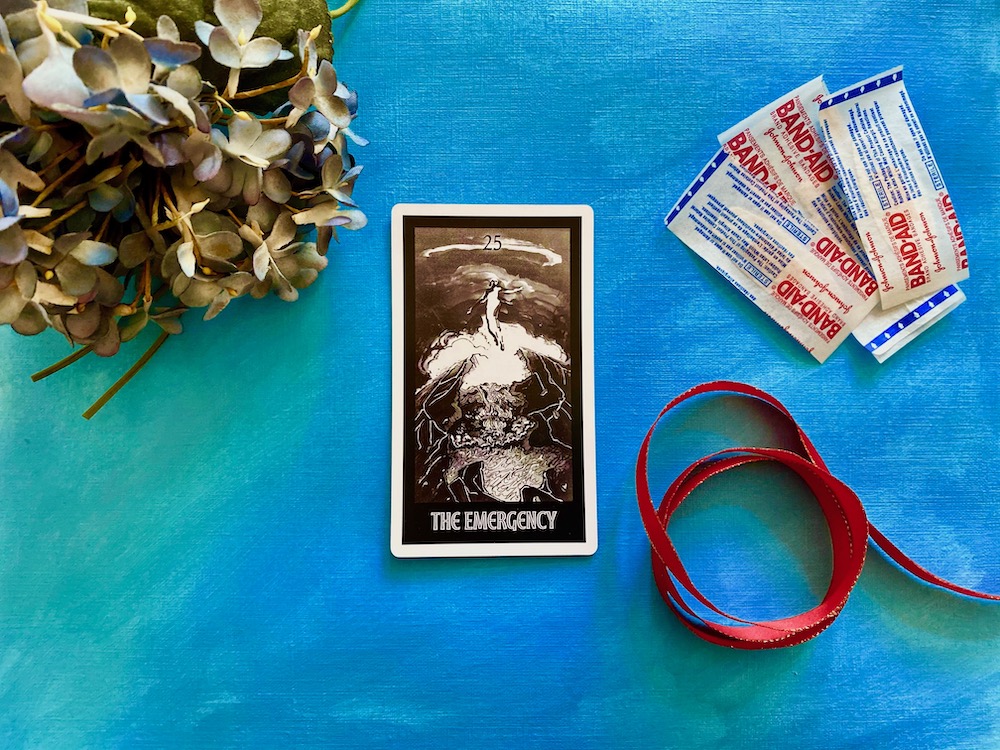“Kids have imaginary friends, right?” I ask.
“Yes,” my therapist says. “But they don’t have imaginary abusers.”

December 2, 2020
My therapist shares an office with a children’s psychologist. I know this because next to my therapist’s chair is a bucket filled with toy trains—yellow, blue, and red—along with several pieces of wooden track. There’s a green stuffed dragon in the bucket, too, and I want to flap its silver wings, run my hand over the soft spikes along its back.
I settle instead for the beige pillow next to me. It’s lumpy and pilled, and I hold it with both arms against my stomach.
“How are you?” my therapist asks.
“Fine,” I say.
There are no diplomas hanging on the white walls, no clock, and no windows. It’s quiet, except for the whir of the white-noise machine. It’s as if we are submerged in a submarine miles below the sea.
I stare down at the wooden coffee table between us, a piece of wrecked ship, and tell him I don’t feel like talking—I ask if we can play with the train set instead.
My therapist clears the coffee table and we sit cross-legged on opposite sides. We click pieces of track together to form a figure-eight, then send trains sailing back and forth. He asks if I had a train set as a kid, and I say yes, an electric one with lights that I got for Christmas when I was seven. I ask my therapist if he had one, and he says no, but in a way that sounds as though he wished he had. I expect my therapist to ask me another question, but he doesn’t, and for a moment I imagine him as a little boy, wistful for another kid’s toy. My right leg falls asleep, and I stretch it out in front of me before moving back to the couch. As a kid, I could play on the floor for hours.
My therapist moves to a new office a few months into our sessions. He said goodbye to the children’s psychologist and found a space he could have to himself.
“Why doesn’t your new couch have arms?” I ask.
He tells me it’s not really a couch but more of a daybed. He tells me he likes its sleek design. I tell him I think its design sucks and that he should’ve kept the old couch.
He laughs and then I start laughing, too, but I really do hate it.
It’s in this new grown-up office that I tell my therapist about the man from church who used to hold me in his arms and touch me between my legs. I don’t know why I am telling him this now—it just no longer feels like something I can keep inside.
The man from church used to whisper in my ear while he touched me, and his arm across my chest felt like the strap of a too-tight seatbelt. But I can’t remember what he was wearing, I tell my therapist, and I can’t remember his last name. Maybe it was just a dream, I say, some kind of sick fantasy. I stare down at my therapist’s brown loafers.
“Kids have imaginary friends, right?” I ask.
“Yes,” my therapist says. “But they don’t have imaginary abusers.”
Later, while walking my neighbor’s German Shepherd, I text my mom to see if she remembers the man from church. Instead of returning my text, she calls me five times in a row. I stare at my phone, feel the pulsing vibration in my hand. I can’t bring myself to answer.
The dog pulls me toward a patch of dirt by the edge of the sidewalk, squats, and pees. She stares up at me with wide, trusting eyes and a lolling tongue.
“Good girl,” I tell her, and we continue on our way.
Growing up, my family preferred male dogs over female dogs because female dogs were dirty. I was told that when a girl dog pees, it gets all over her fur down there and that girl dogs have periods which are gross, and that even when they’re not on their periods, things leak out of their vaginas. My family didn’t want a girl dog lying around the house with her leaking vagina contaminating the carpets, the couch, the beds.
I knew from an early age that having a vagina made me dirty; I also knew that men liked dirty things.
My mom finally gives up trying to call and texts me back: Yes, I remember him. Why?
I put my phone on silent and slip it into my pocket.
“Tic-tac-toe or hangman?” my therapist asks at our next session.
I take the pad of paper and pen, draw six horizontal dashes, and while my therapist slowly hangs himself, I think of all the things I don’t want to say.
“V-I-Z-S-L-A,” I say, when my therapist finally gives up. “It’s a Hungarian hunting dog.”
He’d guessed the “I,” the “A,” the “S,” and “L.” Not bad, but it was still game over.
“Another round?” he asks.
I say no, and we sit in silence until my therapist’s new space heater starts to roar. It’s squat and square and automatically turns on and off according to shifts in temperature. A red light blinks whenever its blades spin, like a warning, danger ahead.
“I should’ve known better,” I finally say, staring at the red light. “The man from church, I didn’t say no.”
My voice goes quiet under the whirring noise, and I expect my therapist to ask me to speak louder, but he doesn’t. Instead, he just turns the heater off.
“That doesn’t mean it was your fault,” he tells me.
I shake my head, explain that I was the one who approached the man from church, that I remember reaching up my arms—kid-speak for “hold me.” I confess that when the man from church asked me if his hand between my legs felt good, I nodded yes. Face burning, I wait for my therapist to agree that I was complicit, or at least not entirely blameless, but he doesn’t. Instead, he says something about “the incredible imbalance of power” and about a “child’s inability to give consent.” I nod, staring at a loose thread in the carpet. I am both the grown woman trying to process my therapist’s words and the little girl who has felt for so long that she is to blame. Together, we consider for the first time that maybe she didn’t make it up, that maybe she didn’t ask for it, that maybe it really wasn’t her fault.
I want to run, but she asks me to stay.



